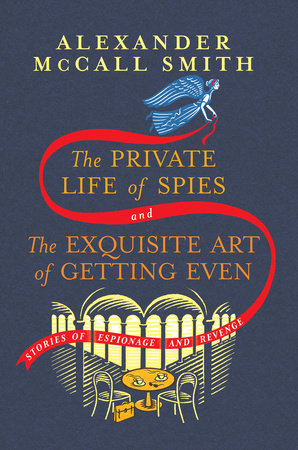
May 2024
The Private Life of Spies is a collection of stories from the world of espionage by Alexander McCall Smith, available in paperback this month. This extract is taken from the story ‘Donald and Yevgeni’.
The man with the scholarly air opened the photograph album. He handled it gently, in the way of a porter in an auction house holding an Old Master drawing. He was not wearing the white gloves that such porters wear, but there was in his expression much the same care and reverence.
‘These photographs were passed on to me by my grand-father,’ he said. ‘Long deceased. His entire career was in the consular service. He was an indiscriminate photographer. He snapped everything.’
The woman nodded. ‘How useful’.
‘Yes. He said to me, you know, that he could not understand how people could do without having a photographic record of their lives. It was beyond him.’
The woman said that she saw how one might feel that. She was not a photographer herself – apart from the occasional family picture – but she enjoyed looking at other people’s photographs. ‘Although I must confess that sometimes I find them sad.’
‘Why should they be sad? Particularly if the people in the photograph are smiling – as they usually are? Why sad?’
She looked thoughtful. ‘I find them sad because when the photographs are older ones, I reflect on the fact that everyone in the picture is likely to be no more. It’s to do with the transience of life.’
‘Vita brevis est.’
‘Exactly. It is.’
He thought of something. ‘In the past, people in photographs kept their mouths closed – for the most part.’ He paused. ‘And you know why?’
She waited for him to explain.
‘Because of their teeth. People used to have gaps. It was very common. Gaps or rotten teeth. Dental hygiene in those days was not what it is today.’
She winced. Anything to do with teeth or nasal passaged made her wince.
‘I was looking at a photograph the other day,’ he went on, ‘of a group of soldiers going off to France. Some of them boys, or not far off it. 1914.’
‘How sad.’
‘Yes, it was. But I don’t think they knew what they were in for. They were all very cheerful and smiling. So, we saw their teeth. Most of them, as far as I could see, had lost some. Either that or there were lots of blackened stumps.’
They were silent. He pointed to one of the photographs. It was a black-and-white picture taken in an office somewhere. A man sat at a desk, while another stood behind him. In the corner was a third figure, wearing a strange costume. The man in the costume was diminutive.
‘See?’ he said.
She peered at the photograph.
‘Washington,’ he said. ‘The man sitting down is the British ambassador, a man called Archibald Clark Kerr. A very colourful character, which is putting it mildly. Behind him there, that tall, distinguished-looking man is Donald Maclean. He was at Gresham’s School, Norfolk, where I went actually. It’s how I became interested in him. Britten was there too. You can see his name on a board in the school hall – and Maclean’s too. A prize of some sort. Then he went on to King’s College, Cambridge. He was a member of the Apostles. You know what that means?’
She nodded. She had a vague idea. ‘A secret society in Cambridge, wasn’t it? John Maynard Keynes – and others.’
‘That’s them. They met to read one another papers and discuss issues of the day. They were self-consciously elitist. A bit precious. In fact, really precious. Wittgenstein was a member. He didn’t like it very much.’
‘He wouldn’t fit in, I imagine.’
‘No, he was odd. He used to sit in a cinema in Cambridge eating buttered toast. I don’t know where I read that and whether it’s true. It’s one of those things that sticks in the mind. Then he wrote the Tractacus Logico-Philosophicus.’
‘Now, there’s a title.’
He smiled at that. Pointing at the standing figure in the photograph he continued, ‘Maclean was very urbane, don’t you think? First Secretary in the embassy. The consummate British diplomat. And in the corner there – that’s Yevgeni Yost, the ambassador’s Russian valet, believe it or not, dressed as a Cossack. A dwarf, as they called such people in those days. And still do, although there may be a new term – it’s so difficult to keep up.’
She stared at the photograph. ‘Are you serious?’ she said. ‘Do you mean to say that the British ambassador to Washington had a Russian valet?’
‘He did. Yes. Given to him by Stalin at the end of his posting to Moscow. Archie Clark Kerr was ambassador there before he went to Washington, and got on very well with Stalin.’
‘You said: given?’
‘Yes, that’s the sort of thing you could do if you were Stalin. Slavery had many different faces, remember.’ He paused. ‘It’s all there in accounts of those times. Look it up.’
She searched for words, and decided on, ‘Good heavens’.
He looked at her quizzically. ‘How many idealists do you see in that photograph? One? Two? Three?’ He paused. ‘And how many spies?’
She shook her head. ‘Who knows?’
‘I do’, he said. And then added, ‘Although, when I look at this picture, I find myself asking, How many people keep tiny Cossacks in their office?’
She laughed. ‘Is this really true? It isn’t some imaginative spy story?’
‘Absolutely’, she said. ‘Every last word of it. Listen.’
____________
The Private Life of Spies is available in paperback here.
